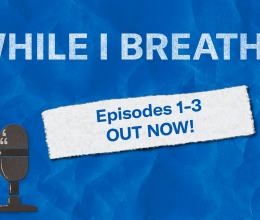
Episode 2: You Have the Right to an Attorney (?)
The eviction crisis is ongoing in South Carolina. Our first guest today is Tony Jones, a student at the University of South Carolina School of Law who has a deeply frustrating story to share involving South Carolina's landlord-tenant laws.
In the second half of the show, we have an interview with Michelle Mapp about what Eviction Right to Counsel means and how we can achieve it.
Use this link to write your lawmaker about Eviction Right to Counsel and South Carolina House Bill 3844, which could make that right a reality: aclusc.org/eviction
Our study on the economic benefits of Eviction Right to Counsel: https://www.aclusc.org/en/south-carolina-renters-should-have-right-legal-counsel-when-facing-eviction
Eviction Lab study on serial eviction filings in Charleston, S.C., and Birmingham, AL: https://evictionlab.org/serial-eviction-filings/
Music credits: A Spot on the Hill, Daft Hartley
Transcript
PAUL BOWERS: Welcome to episode two of While I Breathe, a production of the ACLU of South Carolina. Today we're picking up where we left off in episode one, examining the civil liberties issues at the root of the housing crisis and discussing how we can solve them. I'm your host, Paul Bowers.
JACE WOODRUM: And I'm your host, Jace Woodrum.
BOWERS: Jace, when I say you have the right to an attorney, what comes to mind? Any particular scenes, TV shows, movies?
WOODRUM: Yeah, of course. I mean, for me, Law & Order comes to mind. Every episode, they remind people that they're arresting, right? "You have the right to an attorney." And as someone who isn't an attorney, I've never actually questioned whether or not that was entirely true. I just trusted what I saw on TV.
BOWERS: Yeah, I would take anything Stabler told me at face value, probably.
WOODRUM: Fair enough. Fair enough.
BOWERS: I think about, and this is a very nerdy answer, but when I was in high school, I remember it was one of those days near the end of the school year and they, they rolled in the TV cart because I was of that age where there was a TV cart, and they made us watch this made-for-TV movie called Gideon's Trumpet. I need to go back and watch it. It had, I believe it was Henry Fonda in the role of Gideon, and this was based on the real life court case Gideon v. Wainwright, which gave us the right to an attorney in criminal cases.
I remember it being kind of dry. This was not a very exciting end-of-school-year movie, but I was into it. Everybody else kind of fell asleep.
WOODRUM: That aligns with everything I know about you, Paul.
BOWERS: That's pretty on brand. On the podcast today, we're going to talk about the right to an attorney. We're going to talk about the idea that you could have the right to an attorney not just in criminal cases, but also in certain civil cases where you're facing the possibility of eviction from your home. So the term for this is eviction right to counsel, and in the second half of today's show, we'll get into what that means, how we can achieve it, as well as how you can get involved, our listeners, in the fight to make it happen.
Our first guest today is Tony Jones. He's a student at the University of South Carolina School of Law. And, Jace, you and I know Tony because he was an intern in summer of 2023, when he was with us through the Southern Legal Internship Program. I was not his supervisor, but I heard only great things about him. Everybody loved working with Tony. So in addition to being a sharp legal thinker, helpful member of the team, we also found out that Tony had a really frustrating story to share involving housing.
Jace, I knew I was going to get upset going into this interview, but I can kind of feel my blood pressure rising again, just thinking about it. Let's get into it.
WOODRUM: Let's do it.
BOWERS: So I was wondering, to get started, Tony, if you could just tell me a little bit about your life. Where have you lived? Where are you now? What are you doing these days?
TONY JONES: Right. So, pleasure to be on. Thank you for having me. I was born and raised in Columbia, South Carolina. Graduated from a school in Lexington 2. After that, took some time off, worked various jobs. I was at Walmart, Academy Sports. Then I went to Midlands Tech for a little bit and transferred to the College of Charleston, where I majored in political science. Figured I'd try my hand at law school. So I took the LSAT, did OK, applied, got into USC Law, and I've been there ever since. I'm a 2L and I'm back in Columbia and going through the grinds and trials and tribulations of law school.
BOWERS: So the reason I had you on today was just to talk about something that's hard for a lot of people to talk about, which is eviction. It's a lot to go through, but I wondered if you could share a little bit about your eviction story. What happened?
JONES: Well, I could talk about Charleston landlords in general for hours, but for the purposes of the pod, I just want to kind of start from the first point. I have an eviction on my record from a time where I wasn't even evicted.
So I was living on James Island, and for people that don't know, it's a town in Charleston County. It's maybe five minutes' drive from downtown Charleston, you know, $1,300 a month, had three roommates. And, you know, we signed a second lease at that place and we hadn't been late or anything up until the point that I'm getting to now. It was maybe October of 2019. I want to say one of my roommates ended up being late by just a day, I think rent was due on the 5th, got the check in on the 6th, but before we could even get the check in really, we had an eviction notice on our door.
So I was like, OK, well, let's just drop the check off, and send an email and explain the situation, 'Sorry.' No response. Of course, the eviction notice says, you know, you have to go to magistrate's court in 10 days. And, you know, the place had issues. There was a giant rectangular shaped hole in our kitchen. So anytime you took a shower, it was upstairs and downstairs. Anytime you took a shower, the drainage pipes from the shower would leak onto the kitchen floor and you kind of like slip and fall occasionally. But yeah, I wasn't really concerned because I was in college. It was $450. I didn't really care.
BOWERS: This hole was in the ceiling of the kitchen?
JONES: The hole was in the ceiling of the kitchen, and anytime you took -- I assume, I don't know much about housing infrastructure. I'm assuming the hole was there because otherwise it would just kind of drip onto the ceiling and it would cause all sorts of different damage. So they would rather it drip on the floor, and we made complaints and it didn't really matter. And then one time there was this water dripping from the roof into my room anytime it rained. So I would have to put a bucket in my room anytime it rained to, I don't know, not get my floor wet. But again, in college, didn't really mind too much. It is what it is. So, you know, I decided to go to a Magistrate Court ... pro se.
BOWERS: Pro se, sorry -- for the lay people listening, pro se means representing yourself, right?
JONES: Yes, representing yourself, no lawyer. Most landlord-tenant proceedings, the tenant is going to magistrate court pro se. Most people do not go with a lawyer. Pretty pricey. So, you know, I go there. I have like pictures of the hole in the wall. I have pictures of, you know, it leaking from the roof into my room. And basically what I'm trying to do is an inhabitability defense, which basically means that if the landlord isn't upholding their end of the bargain as far as keeping the place habitable, pests, mold, things of that nature, then you can get out of your lease. So that's what I'm trying to do. And, you know, of course they present their case. We were late by, you know, that day, so landlord-tenant law says that we have to be out.
The judge pretty much, you know, is sympathetic to my case and says like, Hey, I'm going to step out of the courtroom. How about you guys talk amongst yourselves and try to figure something out, try to work something out? So judge leaves. It's only us in the courtroom. I start talking to them and say, Hey man, I'd like to live somewhere nicer anyway. You know, we got the water issues, you got the mold issues and holes everywhere and downstairs roof, upstairs roof. Let's just dissolve it. So this was October, and I said, Hey, I got exams, so I can't really move right now. Let's just dissolve it. 1st of January, start fresh. Well, I can start fresh and go somewhere else.
They agreed to that. They were happy to do that because, I think, they were trying to get us out anyway. Because they wanted to up the rent, make some improvements and things like that. We were kind of getting in the way of that. So the judge comes back in and he enters in our agreement. Like, OK, you know, this is great. Glad y 'all agree. But by the way, and this is where kind of -- what's affecting me now comes in. He goes, Yeah, it's an obscure rule and I really don't understand it, but even though this is the dissolving of a lease and you didn't get evicted, I have to put an eviction in the record. Yeah, it's a South Carolina thing. And you know, at the time I was just like, because this was the first place I've ever lived -- so at the time I was like, okay, you know, that's fine. Like I didn't get evicted, but I'm still in my house for another two months, so it is what it is, don't really care.
But obviously today, if I want to apply anywhere, most places that have a property management company running them, it almost always says, cannot have an eviction from the last five years. And technically I do, so I can't apply to most places, most of the places. Luckily I'm somewhere now, we have a private landlord, he's cool. But even today, when I'm in a different financial position than I was in 2019, where I'm able to pay however much in rent, that's something that still affects me. And that's why it's been such an issue I think with that rule.
BOWERS: Wow. This is making me really mad just listening to your story. Every step along the way is so wrong. And it just highlights a lot of things that are so wrong about the way our housing system and our courts are set up in South Carolina.
JONES: Right, right.
BOWERS: It's like even if you win, even if you beat the landlord, even if you defeat the eviction, we still want it to be known to the greater landlord community that you are unworthy of living in any of their properties.
JONES: Yeah.
BOWERS: Tony, you probably know this better than me, but I wanted to go over a few things that I've been learning just in my first few months on the job about housing law and housing rights in South Carolina.
One thing that I didn't know until this summer was that the fee that a landlord must pay to the courts in order to file for eviction is in many cases as low as 40 bucks. And that's one of the cheapest eviction filing fees in the country. And as a result, a pattern that we see is a lot of landlords will use the threat of eviction as a first resort. Like in your case, one of your roommates is maybe a day behind on getting the rent in and suddenly the landlord has put an eviction notice on your door. They go straight to the nuclear option.
Another thing that you highlighted was that you represented yourself in housing court and while that's good practice for somebody who's going to law school, a lot of people wouldn't know where to begin with that.
JONES: Right.
BOWERS: And so, yeah, I mean, another issue in South Carolina is that we don't have a right to counsel for people facing eviction. So unlike if you're facing criminal charges and the courts must provide you with a public defender if you ask, there's no such provision for for people facing eviction.
JONES: Right.
BOWERS: Obviously, if you're late on rent, you probably can't afford to hire a lawyer. And so the vast majority of people going to their magistrate court to contend an eviction, if they go at all, have to represent themselves. And then this last part that you're still dealing with is that an eviction or something that was simply entered into the record as an eviction, even though it wasn't, just follows you for years.
And so yeah, some states have passed eviction sealing laws where as a tenant in certain cases, you can go to court and have that eviction sealed to where the property management company isn't going to see that as a black mark on your record. But we don't have that right here.
JONES: Yeah.
BOWERS: So yeah, right off the bat, you're dealing with three of the most absurd things in South Carolina law. It's so frustrating.
JONES: Kind of going back to your point, you know, it's only $40 for them to do that. The laws here aren't, they aren't targeted to keep the tenant in the home, you know? Like kind of going back to your point, there should be some sort of buffer in between, you know, that nuclear option and just trying to mitigate the situation and trying to construe the law so that the tenant stays in the home.
And then kind of going back to your, the right to counsel in the criminal aspect, I mean, if you look at the point of having a right to counsel in the criminal sense, it's to assure that, you know, harm cannot be done to you by the state as far as being put in jail, serious fines and things of that nature. But then, you know, you look at it from the landlord-tenant perspective. There are few harms greater than being kicked out of your home. Some people go off into the extreme cold, the extreme heat. Just not having shelter does terrible, terrible detrimental things to your mental health. People have pets, people have children. So it's not saying that, you know, eviction is always as serious as any criminal charge, but it's up there when it comes to things that you might need a public defender or someone there to help you assert your rights just like you would in a criminal proceeding, because you can have a public defender for several minor things that aren't as detrimental to your health and your well-being as being evicted.
BOWERS: Right. One thing you've said before is that your sense is that a lot of people in South Carolina have dealt with similar situations in one way or another. And I mean, I think you're right. We have an eviction crisis in the state and especially in metro areas like Columbia, Charleston, Greenville, we're seeing some of the highest eviction rates per capita in the country. There was a Princeton Eviction Lab study out a few years ago that showed those cities were near the top. North Charleston, where I live, was Number One in evictions per capita. So yeah, I mean, it's something that's deeply personal and tied to very specific individual circumstances. But parts of your story are just so widespread. Probably a lot of people listening to this have dealt with some part of it, if not all of it, before in their lives.
JONES: Oh, right. It's scary. You get that notice and I could see a lot of people not knowing what to do. It says either come to magistrate court or vacate within 10 days, and people don't know the defenses that they can raise. Maybe they aren't familiar with, you know, the term "dissolving a lease," so they're like, Well, maybe it's not worth it to try to go and mitigate. So they're expecting you not to show up in the first place and I don't know the number but I'm pretty sure a lot of people don't.
BOWERS: In your time living back and forth between Charleston and Columbia, have you have you met other people dealing with similar situations, or have you known people who had similar issues with with housing?
JONES: You know, the unique thing about my situation, I think, is in why I think it's so difficult to talk about and why I think talking about eviction in my space is a little taboo is because I felt like I've been in spaces where that isn't really common. You know, I went to College of Charleston. It's a pretty expensive school. A lot of people from upstate come down here, you know, and it's a pretty expensive place to live. So if you've got kids coming to college in Charleston, it's likely that you're not, you know, always well off, but generally a lot of my friends that, you know, their parents cover their rent, their car, things of that nature. So I didn't really, I didn't really -- I wasn't really around many people that were dealing with that sort of thing. So I kind of wore it as a badge of shame almost because I was the only one that I knew that was dealing with that in my space. So it just felt embarrassing. And then in law school, of course I'm in a much better place. I'm not dealing with that now, but even here, it's just, it just doesn't really seem like a huge concern amongst many of the students here. It's not really something that they talk about. You know, you can't work in law school, so you're really just living off of loans. And oftentimes, you know, I felt like I wasn't going to certain events. I wasn't traveling certain places just because I didn't have the disposable income to do that. So, you know, I'm not trying to pity myself like, Oh, I'm in these spaces where that doesn't happen, but it's more so my first time really having the space to talk about it and not feel like I would wouldn't be somewhere where people wouldn't understand.
BOWERS: Yeah, I think you're right about that taboo nature of talking about eviction or even just housing insecurity. You know, people feel like it's a badge of shame, even though it's not.
Well, that's all I that's all I had for you. Was there anything else that I missed or anything else you want to bring up?
JONES: I think that's pretty much all I had. I just think that rule that you have the eviction on your record, even when the lease is dissolved, is something that I don't think many people talk about. And it's something that I'm happy that you're shedding some light on.
BOWERS: Yeah. I hope people listen. I want to make this more of a political issue than it is.
JONES: It needs to be. We need to be in the streets about this.
BOWERS: Absolutely. Yes.
WOODRUM: Eviction right to council is not a brand new idea. This right already exists in law in 17 cities, 4 states, and 1 county, according to the National Coalition for a Civil Right to Council. We know from those places that it makes a measurable difference. That's both in the lives of tenants who are more likely to stay in their homes, and in the budgets of local governments, which save money on social services and safety net expenses for people who lose their homes.
Now, our next guest is Michelle Mapp, a dear friend of the ACLU of South Carolina, who until recently was on staff with us as an Equal Justice Works fellow and our advocacy director. Michelle brought a lot of gifts to our organization, and one of them was a focus on housing justice, and she knows it all. She's been involved in the fight for affordable housing and tenant rights for years. And even though she's left us, she agreed to come on the podcast to talk with Paul about a few simple ideas that could change the lives of South Carolinians today. So let's listen in to their conversation.
BOWERS: I'm here with Michelle Mapp, who is a good friend and former advocacy director for the ACLU of South Carolina. She recently moved on to do bigger and better things, but we pulled her in for one more job. Michelle, thank you so much for coming on to talk about eviction right to counsel.
MICHELLE MAPP: Thanks, Paul. Thanks for having me.
BOWERS: So Michelle and I are both North Charlestonians. We live in what is by some measures the eviction capital of the United States. Some of the most recent data we have shows that evictions per capita are highest in our city right here. So it is a real emergency that is affecting a lot of our neighbors. And so I'm really grateful to Michelle's expertise and the way she's led on this issue in our state.
I wanted to start by talking about one of the solutions that I learned about for the first time from you, Michelle. What do you mean when you say eviction right to counsel?
MAPP: So I think most people have heard the line, "You have a right to an attorney and if you cannot afford one, one will be provided for you," in a criminal law context. You know, we've heard it on Law & Order and all these TV shows. Well, the United States Supreme Court has said in civil matters, you don't have a right to counsel.
And so in order for someone who's facing an eviction or someone who may have a child custody dispute, in order for that person to have an attorney appointed to them, you have to do it legislatively. And so eviction right to counsel is a process whereby local governments or state legislature would pass a law that says for this specific group of folks, if you cannot afford an attorney when you're facing an eviction in court, one will be provided for you by the state or by the local government. And right now in America, there are four states and about 20 jurisdictions who provide eviction right to counsel for tenants who are facing eviction.
BOWERS: We'll talk about a few statistics today, but one that was not surprising is just that most of the time people facing eviction don't have a lawyer to represent them. In 99% of eviction proceedings, renters have no legal representation. And that makes sense. If you're facing eviction, often it's because you're behind on rent. And so it makes sense that you would not be able to afford an attorney either.
But I've been talking to a few people who faced eviction and really could have used that legal assistance in that situation. One is someone we both know, Tony, our former intern from the ACLU. He talked about facing eviction, and Tony's not like most people. He's a law student now. He's got a really sharp legal mind. And so he actually went through the process of representing himself in court, which most people, myself included, would not know how to even begin doing. So the idea of having someone there to give you legal advice, to represent you in court, is something that I can see how that would immediately affect the lives of a lot of people in the state.
MAPP: Yeah, you know, eviction is a complex legal process for a lot of folks once they get that eviction notice, because they can't afford rent. As you said, it's likely they're not going to be able to afford an attorney. And so oftentimes what you have are people who pack up and move, even though they may have a legal recourse. The eviction may not be valid, but you have a lot of folks because they don't know the process or either they act too late. South Carolina is, is one state in which you have to file an answer to the eviction notice to be able to even get a court date to go and argue your side of the case. And so if you let that window go by and don't file that rule to show cause, then you don't even get the opportunity. And so it is a complex legal process and it's hard to imagine that anyone, even someone with a law degree, would be able to go through it alone if they didn't understand South Carolina's landlord-tenant laws.
BOWERS: So one thing that you led at the ACLU of South Carolina was the commissioning of a report on the economic impact. You know, looking at the state of affairs in South Carolina, our housing market, our eviction rates, what would be the real impact if we were to implement eviction right to counsel? So this came out December 2022. Among other things, the report found that a right to counsel leads to more than 90% of tenants avoiding disruptive displacement in South Carolina. Specifically, they found that 18,300 South Carolinians would likely avoid a major disruption to their lives each year.
I guess speak to that first. I mean, how would that play out in people's lives and how would that affect us as a state?
MAPP: Sure. So I think the first thing that we want to clarify, because I think when folks think about eviction right to counsel, and they think about tenants having representation, they automatically believe it's about trying to get tenants out of having to pay the rent, which is not the case. And so the whole point of representation is for tenants who have a valid claim and they can stay in their unit, you want those tenants to stay in their units. But sometimes, you know, the landlord has a legitimate reason for evicting the tenant. Maybe the lease is up and now the landlord's going to sell the property or do something else. And so they, you know, they've given the tenant notice that they have to leave and the tenant is refusing to leave.
Well, eviction right to counsel and the whole push for legal representation is to avoid what we call a disruptive displacement, which is having a tenant whose goods, you know, household furniture and things are set out on the side of the street by local law enforcement. You know, having an attorney who can negotiate the terms of a move out, who can extend the time that a tenant may have to be able to find that next place. Or if the tenant has a valid reason and can stay in the apartment, just to be able to negotiate all those terms, negotiate how the landlord's going to be paid if back rent is owed, is really to avoid having families having children with no place to go, you know, not ending up at the local hospitals or the local homeless service centers. And so it's really about trying to keep families as stable as possible because we know, for a child who faces an eviction, it's disruptive to them, not only from a personal standpoint, but also in terms of their education. Children who have to -- transient students, as they're sometimes called, who have to move from place to place throughout the school year, we know it has an impact on not just that student, but other students in the classroom when you have a lot of students coming in and out of a class throughout a school year.
And so it's really about trying to avoid that disruption in the lives of tenants.
BOWERS: One thing that stands out to me about the current state of eviction in South Carolina is how heavily the burden falls on families, especially on mothers with children. I hadn't looked at the numbers in a while, but the most recent stats we have for our public school system are that we have 12,000 homeless youth, and those are just the ones that we know of and can count enrolled in schools. And yeah, eviction is a pretty traumatic life event for anyone, but especially for families with kids. We hear a lot of talk in the state legislature about protecting families, about defending the lives of children. If we want to actually save the lives of kids, is this a sound policy for pursuing that?
MAPP: Sure, you know, when I think about, you know, Maslow's hierarchy of needs: food, shelter, water, you know, are those basic human needs. And so the expectation that children are going to be able to come to school and show up as their best selves and learn if they don't have stable shelter, you know, we are kidding ourselves.
We know that there's data out there that also says that for most children, their introduction into America's judicial system, court system, oftentimes is either through an eviction or some sort of family divorce or something that's happening in the family dynamic. And so we know that if we can prevent these evictions, prevent children from having to suffer the negative consequences of having to move schools, move teachers, not having a stable place to lay their head at night or to do their homework -- if we can prevent that, we know we'll have a positive impact on the future of these children in South Carolina.
BOWERS: One more stat that really stood out is just looking at the pure economic impact of evictions and what would be different if this policy were enacted. So the report found that for every $1 spent providing representation to tenants facing eviction, the state of South Carolina would see an economic benefit of about $2.92. So roughly we're talking about a $3 return for every dollar spent. How do we arrive at that figure? What are those expenses and what are the economic benefits that we'd be seeing?
MAPP: So, you know, there's a lot of talk about being good stewards of our tax dollars and the amount of money that goes into social safety net programs. Here is a study that directly shows that every time a family is evicted, there are a monetary tax consequence and burden that the state has to carry, whether that's the cost of homelessness, whether that's the cost we know that there's increased hospitalizations and medical expenses related to evictions. We know that there are educational costs related to students and absenteeism in those things and how the federal dollars are based on actual students being in the classroom in their seats each day.
And so what the Stout Report does is it goes through and it quantifies all the different costs. And so as part of the process, we talked to homeless service providers, we talked to mental health professionals, we talked to medical in the hospital system within the state to try to quantify what those costs are associated with someone being displaced from their home.
And on the benefit side, as you reduce those outlays of cost, that's a cost savings to the state. And so the ability to spend $1 providing legal representation that's going to help avoid evictions saves the state virtually $3 for every $1 we would spend.
BOWERS: So the first question. you often hear when you propose something to a politician at any level is, okay, but how do we pay for it? And I know in the long run, this pays for itself. The report found that it would cost $7.2 million upfront to represent people, to pay for that legal representation, but that in return, the state would receive a fiscal benefit of about 21 million annually. That's that threefold return. But there is the matter of paying for it upfront. How would you propose that the state pay for legal representation?
MAPP: Sure. So initially, the goal was that our state received eviction rental assistance, federal funding, and that up to 10 % of those funds could be used for eviction right to counsel. A number of other states and municipalities had to use their funding in that way. We got two very large tranches of capital through the national program and could have used those funds. We have ERA, two funds that the state still has in its possession that have to be deployed by September of 2025. And so there's enough capital there that we could see this program. But long-term, we think the best solution is for, for lack of a better word, evictions to pay for evictions.
Right now in the state of South Carolina, it costs only $40 to file an eviction. The average cost to file an eviction in the country is about $115. In Alabama, for example, it's $250 to file an eviction. So we know if we just doubled the cost to file an eviction in our state, that that additional $40 would be enough to help pay for the program annually and we would still have a surplus left over to go to the state. There are a number of other legal fees that are charged in the state and our eviction filing fee is one of the lowest in the States. We are the third lowest eviction filing fee in the country. The only two places lower are Maryland and D.C., which are both at $15. And so needless to say, South Carolina, Maryland, and D.C. tend to be the places in the country that have the highest eviction filing rates.
So we know that there's a direct correlation between that eviction filing fee and what it is in landlord behavior. So there was a study that the eviction lab did that they looked at eviction filings in Charleston, South Carolina versus eviction filings in Birmingham, Alabama. So $40 eviction filing fee versus a $250 eviction filing fee. And just one statistic was in Charleston, the serial eviction filing rate, meaning one landlord filing eviction against the same one tenant was almost 60% in Charleston, whereas that same serial eviction filing rate in Birmingham, Alabama, was about 7%. And so it makes a difference if you make the process really cheap and really complicated on behalf of the tenant. It encourages in some way landlord behavior to file these evictions month after month after month against tenants. And what the data actually shows that when you have legal representation and when you have an attorney involved in the process that the landlord is more likely to get paid.
And so, anything that we can do that discourages sort of the frivolous filing of evictions on the front end by increasing the fee and then having legal representation for those tenants who cannot afford an attorney will be beneficial, not just in terms of keeping tenants housed, but also in ensuring that landlords are in fact paid.
BOWERS: Yeah, that is an interesting dynamic that there are a lot of cases where a landlord is using eviction as a first resort rather than a last one. A tenant is behind on rent one month and they get an eviction notice on their door. And if your goal is to get someone out of the house, that might work. But if your goal is to recoup that money, it seems unlikely that you're going to see that money. The tenant's just going to leave rather than show up in court.
MAPP: In South Carolina, what we have in fact done is in some ways created a debt collection model for landlords with the eviction filing fee being so low. What we know is that for those serial eviction filings, the tenants are paying on average about $180 additional each month when you figure in court costs plus late fees. So every month, month after month, the same tenants having an eviction filed against them, they pay the rent, they just don't pay it. By the fifth, they pay it on the eighth or they pay it on the ninth. But when they're paying it, they're paying an additional $180 per month.
BOWERS: Well, Michelle, thanks so much for taking the time again. I've learned a lot from you about this. This is something that means a lot to me as a parent. It means a lot to me as someone whose neighbors are struggling to make rent all the time. This is something that could change and save a lot of lives in South Carolina. So thanks for the work you've done on it.
MAPP: Oh, you're you're welcome. It's an important issue. I think as we often talk about affordable housing and the need for affordable housing in our community and the need to increase wages so that folks can afford affordable housing, I think it's important that we always remember that there's as critical a need to keep people housed. And that's why I think this issue is so critically important, because if we get folks into housing, but they can't stay housed or they're running into barriers to be able to remain in their house. It just creates this cycle, as we've already talked about, that's really detrimental, especially for children. And we know that overwhelmingly in South Carolina, women with children, single women with children, are the ones who are being evicted.
WOODRUM: Y'all, thanks for listening to the podcast. Whenever we can, we're going to end each episode with a call to action, something concrete you can do to make a change. So today I want to point you to a bill that's been introduced in the South Carolina legislature, House Bill 3844. It would establish eviction right to counsel statewide.
One way to make a bill move in the state house is to get more co -sponsors signed onto it. Right now on our website, we have an email writing tool that will connect you with your state representative. So it's got some basic information about the bill. It looks up your house district for you based on your address. Then you can customize and send a message to your elected official to help make this happen. Super easy to do, but it can make a big difference. So you can do it right now at aclusc.org/eviction. I'll say that again, aclusc.org/eviction, or you can check the link in the show notes.
Next up on the podcast, we'll be talking with a South Carolina tenant organizer about the rights of renters, how the laws need to change, and what we can do to build power in the meantime. Until then, while I breathe, I hope.
Related content

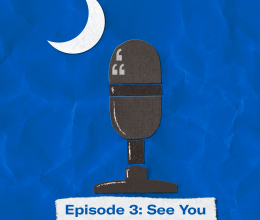
Episode 3: See You in Housing Court
April 19, 2024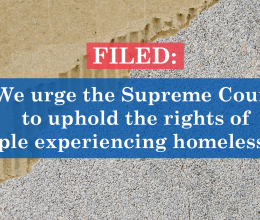
ACLU-SC urges Supreme Court to uphold rights of people experiencing...
April 17, 2024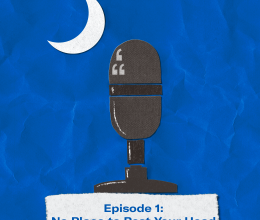
Episode 1: No Place to Rest Your Head
March 22, 2024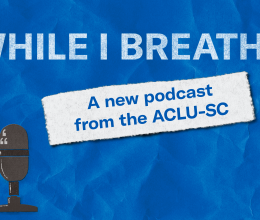
Podcast Trailer: While I Breathe
March 20, 2024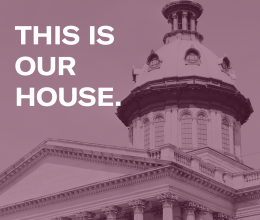
Prevent Evictions Through Right to Counsel
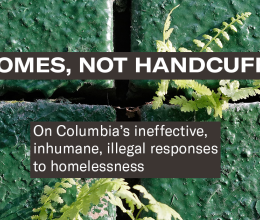
Civil rights groups demand repeal of Columbia’s ineffective,...
September 28, 2023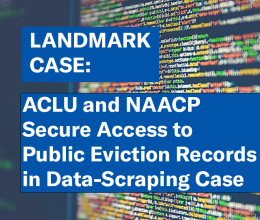
ACLU and NAACP Secure Access to Public Eviction Records in Data...
September 13, 2023
